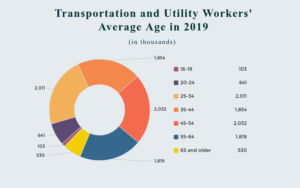Truckers: One of Our Many Heroes of the Pandemic
It is without a doubt that coronavirus has caused a major ripple through every aspect of life across the world. Over the past few weeks across the U.S, we have seen school closures, an unprecedented amount of unemployment claims and an abrupt halt in most of our daily lives. While many Americans are following the CDC guidelines for remaining isolated from others inside their homes, one demographic is not: truckers.

Truckers are the ultimate lifeline maintaining critical supply chains to supply goods and foods that are currently in high demand. Many do not realize that when they pick up their local produce every week, an average of five trucks are needed to get those products from the ground to the grocery store. And with store shelves looking empty to customers, there is growing pressure on these supply chains to deliver essential products to the population.
As Chris Schmus, president and CEO of PDL Drivers, Inc, noted last week, “Without the trucks, nothing happens. Everything moves by truck in this country so in order to keep the economy rolling, to keep people being fed and everything else, the trucks need to move”.
With the general population already in a state of panic, slowing supply chains will only further stress individuals and families to socially isolate with sufficient food, medical and sanitary supplies to remain healthy, explained James Rodger, one trucker. The importance of this workforce is evident, and truckers are continuing to traverse across America’s highways to deliver. Truckers have already begun working additional hours in response to the waiving of a rule by the Federal Motor Carrier Safety Administration that limits the number of hours drivers can be on the road to ensure that critical supplies can continue to be on the move.
Drivers are working longer due to staffing shortages anticipated by the virus. Many of these workers have been on the road for over a month, unable to see their families or enjoy a hot meal in order to deliver for the American people. Many also rely on rest stops to refuel, both for the trucks and themselves. Zach England, CEO of C.R Trucking in Salt Lake City, recently described, “It’s nice to sit down at a restaurant and get out of the truck you’ve been sitting in for the last eight hours”. With many state governments forcing these spaces to shut down, truckers are having to work through being unable to rest after long periods of travel. In response to this growing concern, The U.S Department of Transportation listed rest stops as an “essential business” to provide support to truckers. Rest stops have put new policies in place, such as closing sit-down areas and conducting cleaning regimens more frequently, in order to mitigate the spread of the virus among a vulnerable demographic that is traveling across the entire country.

Truckers largely represent an at-risk group: older males with underlying health issues. A recent study revealed they are also more than twice as likely to be obese and to smoke, with few having health insurance. It has been a concern of this group to receive medical attention if needed; most doctor’s offices do not have space to park a truck, which can mean parking elsewhere and taking a cab, all at the prospect of losing hours driving time. UrgentCareTravel has developed a remote evaluation system for truckers for an initial screening, in order to create a convenient way to ease health concerns.
It is critical in order to be able to come out on the other side of this global event effectively to support our pandemic heroes that are continuing to provide essential services to the economy and greater population despite the risks. The regulations and company services mentioned in this article are some examples of avenues to support these individuals that are on the front lines of COVID-19. These avenues culminate to maintaining resilience in a time where it is being tested the most. The heroes mentioned are carriers of resilience that should be recognized for their contribution to keeping the U.S afloat amidst the significant impacts of the virus.
Sources and Further Reading
How coronavirus is impacting truck drivers across the country
Trucking on the Front Line in Fight Against COVID-19
Coronavirus turns Utah truckers into heroes
Coronavirus concerns cascade across industry and supply chains
COVID-19 And Truck Driver Shortage May Threaten Food Supply Chain
Right now, truck stops are some of America’s most ‘essential businesses’
Alone on the Road, a Trucker’s Long Haul as America Fights the Virus
Coronavirus pandemic, stay-at-home order ripples through trucking industry
